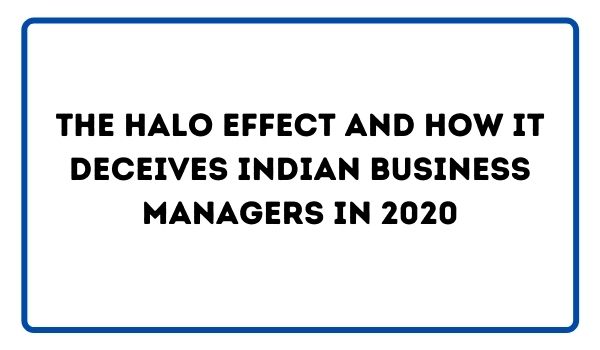The halo effect by Phil Rosenzweig explains how Pseudo Research and narratives built upon such research results are inappropriate for business decision making. The halo effect helps out in unmasking the delusions in the corporate world. In this blog let us look at how the book is relevant especially in the Indian business scenario.
- Why did Yes Bank fail?
- What went wrong in Future retail? successful
- Why Asian Paints are the best?
- How the fall of IL&FS and Yes Bank was so predictable?
- 5 Best mantras for a successful Business?
If you are regularly following business channels, newspapers, books, blogs you would’ve definitely come across such titles
‘Marriage of convenience’ is what Phil Rosenzweig calls it.
All these narratives are built around a few things such as rising stock prices, increasing profits, dividends, a popular investor investing in the business.
This is what Phil Rosenzweig calls out in the halo effect and explains with examples about how little we know while making business decisions.
Though reading the hale effect with case studies on the US businesses we might easily be able to relate all those biases even in decision making in the Indian Business Environment.
Basically, the halo effect is about the biases that exist around business research and decision making based upon data derived from stock prices, corporate profit, and how little they are of use to make the right choice in business.
Are these success formulas useful for making business decisions in real?
A book review was done in the past for the book “Autobiography of a stock” the author tries to explain the process of selecting a stock. There is no doubt that the book was a good read. But one thing about the book was that after 150 pages of filters used to screen stocks, lessons on habits and behavior required to invest in stock markets the author would suggest Yes Bank for investment.
This was quite exhausting. A person who has decades of experience in stock picking could not avoid Yes Bank. The filter the author uses are stringent enough even in the eyes of a most conservative investor. Some of the filters include
- Growth in earnings year on year
- Return on equity higher than the cost of capital
- The current market price is available at a discount to historical price to earnings ratio
Yes bank even after passing through all these filters back then failed to avoid the bad loan growth and avert RBI from taking over its management.
Investors and fund managers who invested back then when everything was fine might have had reasons such as
- New age bank with increasing investment in technology
- Only growth in advances can bring business to a bank and Yes bank is doing it right
- The 4th largest private lender is too big to fail
and many such reasons. But what is the story now for Yes Bank?
- Yes Bank was lethargic in lending and this fall was very much expected
- Ashok Kapoor was a conservative whereas Rana Kapoor is a liberal lender
- Corporate lending banks cannot avert such NPA issues. Retail banking is safer.
Let us now look out at a successful bank at present time, decades back when started with bill discounting and then from there to commercial & wholesale banking, retail banking, mutual funds, investment banking. Kotak Mahindra it is. If we are ought to find the reasons for its success we will most probably end up writing the advantages we found in Yes Bank for investing in Kotak Mahindra with little or no changes.
So how do we differentiate between a Yes Bank and Kotak Mahindra?
This is exactly what Phil Rosenzweig discusses in the Halo effect.
Does the success formula really exist for business?
What are the traits of a successful company in the current world? Most of us might have similar answers such as
- Strong Balance sheet
- Lower cost of capital
- Strong supply chain and distribution network
- Products and services with strong brand awareness
- Great employee culture and satisfaction
- Strong customer connect and considering customer as the king
- Innovation and technological leadership
and more. But if we observe more closely we find all these traits amongst most of the established top players in any industry. And there should be no surprise towards this because that is what the job of new age consultants, corporate advisors is. They ensure that their client employs an efficient system and people according to their available resources and make sure they meet minimum efficiency criteria.
The competitive advantage of businesses is analyzed for long-term investing but even then most of these advantages diminish over time in the long run and businesses need to strive and create a new set of moats that safeguard them from the competition.
And these are no fault of the management of the business, praising a CEO during good times and giving him/her lessons during their bad times is exactly what we are doing.
This doesn’t mean that management isn’t important for a company’s performance. But blaming the management entirely for failure isn’t right.
The halo effect makes two things very clear
- Businesses by nature are bound to decline in performance. You cannot expect a company to survive 2 or 3 decades with little or no diversification.
- Fact remains that the business performance is relative to many variables and most of the time we might not be aware of these variables.
The Halo effect exactly addresses this concern and tells loudly that there is no one defined formula for success.
You would have now thought what’s so secret about this? anybody could say that
The question here is not how known this is to everybody. The real question is whether we are ready to accept this and move on. And if we did this search for long-lasting success in business might stop and we will accept that decision making is done on time to time basis with available options and resources.
The book explores many such research materials, management books, and real-life case studies to make us understand how efforts to isolate the secret of success always come up short.
Strategic Choice and execution – Two elements to approach success
Image source: ( https://timpublishing.wordpress.com/2014/06/23/back-to-basics-porters-generic-strategies-for-sales-execution/ )
Phil Rosenzweig points out in the halo effect that strategic choice and execution capability as two core pillars of success in business. He also points out that these are very uncertain and don’t ensure long-lasting success.
He points out that company performance is relative, not absolute. A company can improve and fall behind its rivals at the same time.
The halo effect perfectly points out with numerous case studies about how exhaustive data doesn’t ensure an accurate prediction of the future and how results from such research can deceive managers.
Conclusion
Given these constraints, the best way to go ahead with decisions that are more in line with our strategic choice and our execution capability.
Falling for narrative doesn’t help in decision making.
The halo effect is very much visible to us today
Look how pharma companies which were written off last year for their dependence on the US FDA, suddenly this year, became competitive on a global level, new production capacity being installed, capturing market share from China.
Narratives change with time.
Consider in a hypothetical situation that Yes Bank doesn’t get nationalized or merges itself with SBI and recovers most of its Bad loans in the next 5 years. And then the narrative would be like “a bad loan is just something that depletes book value in the short run but once these loans are recovered the long-run potential still stays true and the bank was available at a price to book value for which no special knowledge was required”. And the new management might be appreciated by business channels for speeding up the recovery process and successfully turning around the bank to a profitable course
ITC can become a growth stock because it is a leader with an 80% market share in cigarettes, a strong distribution network, strong consumer connect because of integration between different business verticals, and more.
Such lesser we know. The halo effect is one book that clearly underlines our limitations and biases in business decision making.
The halo effect is so far one of the best management books I have read and would suggest it as a good read for anyone interested.
Interested to add more titles to your read list click here.
If you have got something to say about ‘The halo effect’, comment below.
( This blog is no recommendation of any investment. This blog is just about how ‘The halo effect” is relevant today in the Indian business environment)

